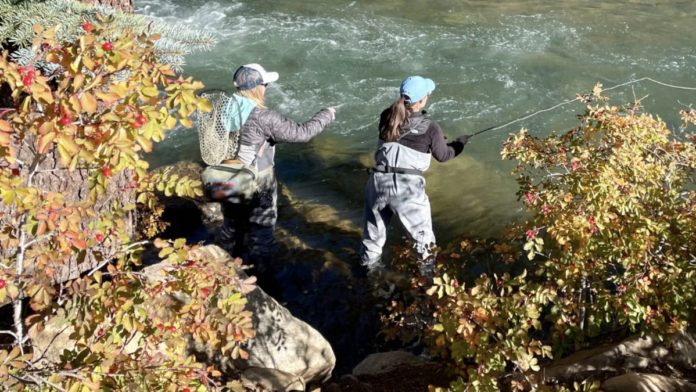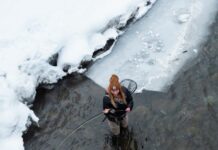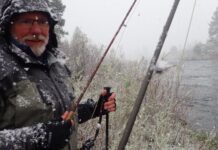Worried, even scared, they wade into the flowing stream, often supported by someone who makes sure they don’t fall.
They reach their rod back; they cast the line forward, as they have been taught, as they have learned.
Again and again, they repeat this motion. Perhaps they will catch a fish; perhaps they won’t. No matter, they catch something else.
Patrick M. Scanlon, a retired Rochester Institute of Technology communications professor, describes this process in his new, fascinating, and inspiring, book from RIT Press: “Casting and Mending: How therapeutic fly fishing heals shattered minds and bodies.”
A longtime fly fisherman, Scanlon gathered information for his book by embedding himself within programs that use fly-fishing instruction to help people dealing with the trauma in their lives.
Casting for Recovery is a free program for women with breast cancer. Another program is for soldiers injured during war and/or dealing with PTSD. Scanlon also spent time with programs that introduce fly fishing to people recovering from addiction.
“Writing the book, for me was a real life-changing experience,” Scanlon told me. “I got to meet a lot of people who were on the razor’s edge of one kind or another. It was revelatory for me. I came out of it. I guess I didn’t really come out of it. I’m still part of that book.”
Using pseudonyms to protect their privacy, Scanlon profiles many of the people in the various programs. He lets them describe the comfort and community they have found in fly fishing, the ancient art of catching fish by getting them to bite at an artificial fly. (It takes practice. Casting a lightweight fly onto the water isn’t easy.)
Breast cancer survivors find new perspective
Nancy Yurik, a breast cancer survivor who lived in Penfield and now lives in Pennsylvania, is identified as “Katie” in the book, took part in Casting for Recovery, which has retreats throughout the nation, in 2015. She had signed up for the program on the Salmon River in central New York because she wanted to learn how to fly fish, not because she wanted to be in a support group.
But it turned out that the group, which mixes volunteers with women dealing with illness, worked a kind of magic.
“It really showed people that they were special and were still worthy of feeling that they were special,” Yurik told me. “Cancer had deflated them as far as feeling worthy. Seeing other people really encouraged them.”
Like the others Scanlon interviewed, Yurik found that fly fishing took her mind off cancer, took it to another place.
“If you’re not familiar with walking on slippery rocks you’re concentrating, you’re trying to do a lot of maneuvering, that’s what you’re thinking about,” she told me.
Anne Wells of Brighton, who is identified as Sue in the book, was diagnosed as having cancer in 2014. She took part in the program on the Salmon River in 2016.
“It was a wonderful experience: the fly fishing, the camaraderie, the openness,” she told Scanlon. “Better in the sense that it felt like a new chapter in reaching out, a new way to think about my cancer, a way to keep growing in my coping with it. That felt like a turning point.”
Veterans learn to cope with injuries, PTSD
Scanlon went to Fort Drum in northern New York to learn about Project Healing Waters, which uses fly fishing to help soldiers dealing with injuries suffered in battle.
One soldier, who was horrifically wounded during the Iraq War, told Scanlon how fly fishing helps his balance, both physical and mental. “It makes me focus,” he says. “Everything else melts away.”
Scanlon also interviewed veterans who have been taught fly fishing as members of OASIS Adaptive Sports (Outdoor Adventures for Sacrifice in Service), a program based in Honeoye that is now part of Compeer, Rochester, Inc.
“My mind runs in a hundred different directions at once,” a veteran who has struggled with PTSD, told Scanlon. “And I go fly fishing and I’m instantly calmed down, and I focus on what I have to do to catch a fish.”
Focusing on the fish, standing in new waters, has its rewards, Scanlon stresses.
“People had good things to say about their experience of fly fishing. It really made a difference in their lives,” Scanlon told me. “They were finding something that was really helping them.”
Learn more about fly fishing support programs
Patrick M. Scanlon profiles several support programs that teach fly fishing to people dealing with illness. Among them are:
From his home in Geneseo, Livingston County, retired senior editor Jim Memmott, writes Remarkable Rochester, who we were, who we are. He can be reached at jmemmott@gannett.com or write Box 274, Geneseo, NY 14454
Credit: Source link































